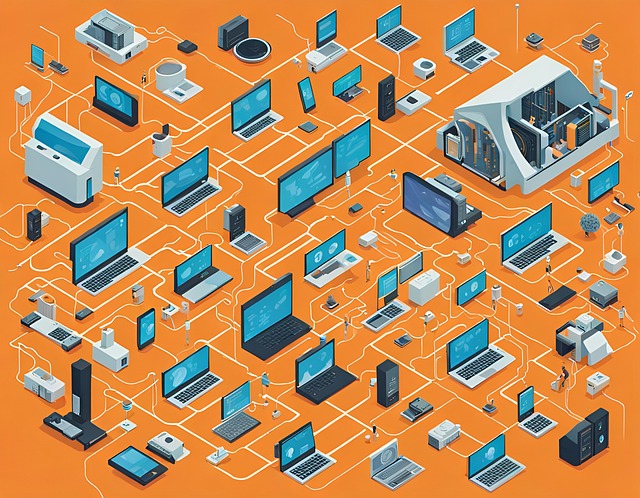AI is transforming restaurant kitchens into more sustainable, cost-effective, and customer-friendly spaces through advanced energy efficiency solutions. By leveraging predictive analytics, smart heating/cooling systems, and intelligent inventory management, restaurants can optimize cooking processes, minimize waste (including food and printed menus), and reduce operational costs. This not only benefits businesses but also appeals to environmentally conscious consumers who increasingly seek sustainable culinary experiences, making AI a key driver for greener restaurant practices.
“The future of dining is here with AI revolutionizing restaurant operations. This article explores how artificial intelligence (AI) is transforming kitchen dynamics, focusing on energy efficiency and digital menu interactions. We delve into specific AI applications that optimize food preparation, reduce waste, and enhance customer experiences through dynamic digital menus. By implementing these innovative AI solutions, restaurants can achieve sustainable practices while boosting their bottom line.”
- AI's Role in Optimizing Kitchen Operations for Energy Efficiency
- Digital Menus: Enhancing Customer Experience and Reducing Waste
- Implementable AI Solutions for Sustainable Restaurant Practices
AI's Role in Optimizing Kitchen Operations for Energy Efficiency

Artificial Intelligence (AI) is transforming restaurant operations, and one of its most significant impacts lies in optimizing kitchen processes to achieve energy efficiency. By leveraging AI algorithms, restaurants can streamline their cooking procedures, minimizing energy wastage at every step. For instance, predictive analytics powered by AI can anticipate customer demands, allowing kitchens to prepare meals efficiently without excess production. This reduces energy consumption, especially when combined with smart heating and cooling systems that adjust according to real-time needs.
Additionally, AI can optimize ingredient management, ensuring that the kitchen uses only what is necessary for each meal. Smart inventory systems, integrated with AI, monitor stock levels and suggest purchases based on usage patterns, reducing food waste and its associated energy costs. These AI energy efficiency solutions for kitchens not only lower operational expenses but also contribute to a more sustainable culinary experience, appealing to environmentally conscious consumers.
Digital Menus: Enhancing Customer Experience and Reducing Waste

Digital menus are transforming the dining experience, offering a modern and interactive approach that caters to today’s tech-savvy customers. By implementing AI technology in restaurant operations, especially for menu presentation, establishments can significantly enhance customer satisfaction while also reaping benefits in terms of sustainability and cost savings. This innovative strategy reduces waste by minimizing printed material and optimizes energy efficiency in kitchens through streamlined processes.
AI-powered digital menus provide an engaging interface, allowing diners to explore dishes with detailed descriptions, high-quality images, and even personalized recommendations based on their preferences. This interactive experience not only educates customers about the menu but also empowers them to make informed choices. Moreover, digital displays enable efficient updates and promotions, ensuring that restaurants can adjust their menus in real-time to reflect seasonal changes or special offers, contributing to reduced food waste and optimized inventory management.
Implementable AI Solutions for Sustainable Restaurant Practices

Implementing AI in restaurants isn’t just about enhancing customer experience; it’s also a powerful tool for sustainable practices. AI energy efficiency solutions for kitchens can significantly reduce operational costs and environmental impact. For instance, predictive analytics powered by AI can optimize food waste by forecasting demand accurately, minimizing overstocking. This not only cuts down on spoilage but also reduces the carbon footprint associated with food production and disposal.
Additionally, AI-driven cooking processes use precise temperature control and automated timing, ensuring efficient energy utilization in kitchens. Smart inventory management systems can automatically trigger reorders when stocks are low, optimizing delivery schedules to minimize fuel consumption and emissions. These AI solutions contribute to a greener restaurant operation, aligning with the growing consumer demand for environmentally conscious businesses.
AI is transforming the restaurant industry by offering innovative solutions for kitchen operations, such as optimizing energy usage and reducing waste. By implementing digital menu systems, restaurants can enhance customer experiences while minimizing environmental impact. These advanced technologies not only contribute to sustainability but also provide a competitive edge in today’s market. Adopting AI energy efficiency solutions for kitchens is a strategic move for restaurateurs aiming to thrive in the future of hospitality.
